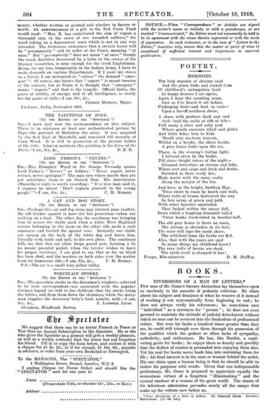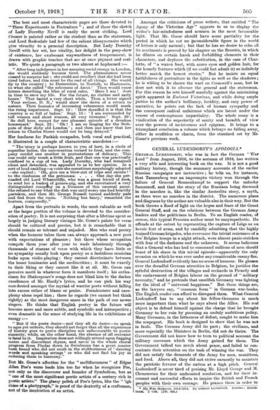BOOKS.
DIVERSIONS OF A MAN OF LETTERS.* FEW men of Mr. Gosse's literary distinction lay themselves open so carelessly to the assaults of pedantic criticism. He chats about his subject and dismisses it when he wearies of it instead of working it out systematically from beginning to end ; he does not always verify his references ; he sometimes uses " individual " as a synonym for " person " ; he does not even pretend to maintain the attitude of judicial detachment without which no man can be received into the Sanhedrim of professional critics. But were his faults a hundred times greater than they are, he could still triumph over them through his possession of the qualities which the pedant so often lacks of sympathy, catholicity, and enthusiasm. He has, like Hazlitt, a captivating gusto for books ; he enjoys them so keenly and greedily that the dullest of readers is persuaded into enjoying them also. Yet his zeal for books never leads him into mistaking them for life ; his final interest is in the man or woman behind the artist. His one claim upon a human being is that he should be able to endow his purposes with words. Given that one indispensable preliminary, Mr. Gosse is prepared to appreciate equally the sententious virtues of a forgotten " Bluestocking " and the cynical candour of a woman of the great world. The charm of his infectious admiration pervades nearly all the essays that make up the volume now before us.
• Semi Diversions of a Man of Letters. By Edmund Goan. London: EeMemann. [7s. 6d. net.]
The beet and most characteristic pages are those devoted to Three Experiinents in Portraiture " ; and of these the sketch
of Lady Dorothy Nevill is easily the most striking. Lord Cromer is painted rather as the student than as the statesman, and Lord Redesdale had few of the salient idiosyncrasies which give vivacity to a personal description. But Lady Dorothy Nevin with her wit, her vitality,, her delight in the peep-show of existence, her exuberant waywardness of temperament, is drawn with graphic touches that are at once piquant and real
istic. We quote a paragraph or two almost at haphazard :—
" Afterlong indulgence in her amazing social energy in London, she would suddenly become tired. The phenomenon never ceased to surprise her ; she could not recollect that she had been tired before, and this must be the end of all things. She would fly to the country ; to Dorsetshire, to Norfolk, to Flaslemere, to-what she called 'the soberness of Ascot.' Then would come letters describing the bliss of rural calm. Here I am ! Just in time to save my life. For the future, no clothes and early hours.' That lasted a very short while. Then a letter signed ' Your recluse, D. N.,' would show. the dawn of a return to nature. Then boutades of increasing vehemence would mark the rising impatience. Sept 12 : How dreadful it is that the country is so full of ladies.' Sept. 15 : I am surrounded by tall women and short women, all very tiresome.' Sept. 20 : So dull here, except for one pleasant episode of a drunken housemaid.' Sept. 23 : Oh.! I am so longing for the fleshpots of dear dirty old London' ; and then one knew that her return to Charles Street would not be long delayed."
Her fondness for Puckish escapades, both vocal and practical, is illustrated in a couple of characteristic anecdotes anecdotes:
"The*story is perhaps known to you of how, in a circle of superfine ladies, the conversation turned to food, and the company outdid one another in protestations of delicacy. This one could only touch a-little fruit, and that one was practically confined to a cup of tea. Lady Dorothy, who had remained silent and detached, -was appealed to as to her opinion. In a sort of loud cackling—a voice she sometimes surprisingly adopted —she replied : Oh, give me a blow-out of tripe and onions ! ' to the confusion of the privieueas. . . . One day she persuaded old Lord Wharncliffe, who was a great friend of hers, to send her a baskek of guinea-pig, and she entertained a very distinguished compftny on a fricassee of this unusual game. Sharefused to say what the dish was until every one had heartily partaken, and then Mr. George Russell turned suddenly pale and fled from the room. Nothing but fancy,' remarked the hostess, composedly."
Apart from the portraits in words, the most valuable as well as the larger portion of the volume is devoted to the consider ation of poetry. It is not surprising that after a lifetime spent so largely in judging literary vintages Mr. Gosse's palate for versa should be cultured and precise, but it is remarkable that it should remain so tolerant and unj aded. Men who read poetry when the humour takes them can always approach a new poet with expectations of pleasure ; but those whose occupation, compels them year after year to wade laboriously through
thousands of stanzas of verse with which they have little or no sympathy usually look upon poetry as a fastidious musician looks upon violin-playing : they cannot discriminate between the lesser luminaries and the mediocrities ; it must be exactly to their liking or they cannot like it at all. Mr. Gosse can perceive merit in whatever form it manifests itself.; his enthu
siasm. for Shakespeare's songs does not blind him, to the darker excellences of Mr. Hardy's lyrics, and he canpick his way sure-footed amongst the myriad of warrior poets without falling into excess either of blame or praise. Formlessness and caco phony alone repel him ; these he regards (we cannot but think rightly) as the most dangerous snare in the path of our newer singers. He thinks that English poetry in the future will become more and more subtle, and symbolic and introspective ; even dramatic in the sense of studying life in its exhibitions of energy :—
" But. if the poets desire and they all do desire—to speak to ages yet unborn, they should not forget that all the experience of history goes to prove discipline not unfavourable to poetic sincerity, while, on the other hand, the absence of all restraint is fatal to it. Inspiration does not willingly attend upon flaggingmetre and discordant rhyme, and never in the whole choral progress from Pindar down to Svrinbume has a great master been found who did not exult in the stubbornness of dancing wordsand speaking strings' or who did not find his joy in reducing them to harmony."
But Mr. GOSSe'S affection, for the " mellifluousness " of Edgar Allan Poe's verse leads him too far when he recognizes Poe, not only as the discoverer and founder of Symbolism, but as " one of the most significant poetic artiste of a century rich in poetic artists." The glassy polish of Poe's lyrics, like the " 'igh shine of a photygraph," is proof of the dexterity of a craftsman, not of the inspiration of an artist. Amongst the criticisms of prose writers, that entitled "The Agony of the Victorian Age " appears to us to display the writer's fair-mindedness and acumen in the most favourable light. That Mr. Gosse should have some partiality for the period in which he cut no indonsiderable figure in the world of letters is only natural; but that he has no desire to echo all its sentiments is proved by his chapter on the Brontes, in which he dilates on certain harsh and forbidding elements in their characters, and deplores the substitution, in the case of Charlotte, of " a waxen bust, with azure eyes and golden hair, for the homely features which (if we could but admit it) so infinitely better match the honest stories." But he insists on equal faithfulness of portraiture in the lights as well as the shadows ; he is willing to be shown the wart on Cromwell's nose, but he does not wish it to obscure the general and the statesman. For this reason he sets himself manfully against the minimizing spirit apparent in Eminent Victorians, and while doing ample justice to the author's brilliancy, lucidity, and easy power of narrative, he points out the lack of human sympathy and the consequent radical unfairness which are latent under the veneer of contemptuous impartiality. The whole essay is a vindication of the superiority of sanity and breadth of view over the powers of incisiveness and epigram. It brings to a triumphant conclusion a volume which betrays no falling away, either in erudition or charm, from the standard set by Mr. Gosse's previous work.







































 Previous page
Previous page